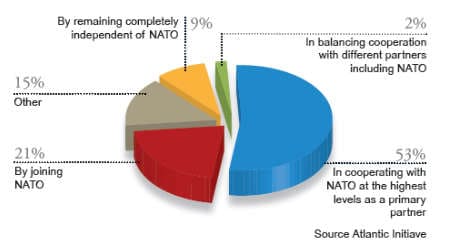In April 2010, The Atlantic Initiative conducted an expert survey in Russia to gauge the path of the NATO -Russia relationship. Here we present the results.

What is the most important confidence-building measure that NATO and Russia should undertake? (click to enlarge)

Do you expect that a joint assessment of Russian and NATO common threats and challenges will improve relations between the two? (click to enlarge)

Is an improved Russia-NATO relationship dependent upon developing President Medvedev’s proposals for a new Security Treaty? (click to enlarge)

NATO has begun drafting a new Strategic Concept in an open process that will offer the chance for the Russian strategic community to make its voice heard. In your view, how receptive is NATO to Russian commentary so far? (click to enlarge)
The survey engaged respondents across Russia, experts in policy analysis who are employed by the country’s most influential think tanks, universities, scholarly journals and newspapers. Some 47 experts, including prestigious participants such as Dr. Panov of the Diplomatic Academy of the Ministry of Foreign Affairs and Prof. Dr. Zapesotsky of the St. Petersburg University of Humanities and Social Sciences, participated in the NATO-sponsored survey.
Over half of the experts believe that Russia’s long-term strategic interests would best be served by cooperating with NATO at the highest possible level as a primary partner
The results indicate that Russia’s strategic community favours increased cooperation between NATO and Russia and is largely optimistic that a deepening of relations between NATO and Russia can be realised.
Over half of the experts believe that Russia’s long-term strategic interests would best be served by cooperating with NATO at the highest possible level as a primary partner. One in five experts even advocate NATO membership.
Two-thirds of respondents feel that improved ties between NATO and Russia are contingent upon further development of President Medvedev’s proposal for a new European security architecture.
Four out of 10 experts believe that improving the dialogue within the NATO-Russia Council is the most important confidence-building measure to improve relations
Three out of four respondents expect that a joint assessment of Russian and NATO common threats and challenges would lead to an improvement in relations. Only onequarter of experts are sceptical on this point.
Four out of 10 experts believe that improving the dialogue within the NATO-Russia Council is the most important confidence-building measure to improve relations. A fifth list cooperation in arms control as the first priority.
The most popular suggestion provided by the experts to make the NATO-Russia Council more effective is to reduce the Council’s agenda and focus to a greater extent on practical concerns.
New challenges include threats posed by international terrorism, Islamic fundamentalism, cyber attacks and drug trafficking. These new challenges provide common ground on which NATO can cooperate with Russia.
Experts are evenly split on NATO’s new Strategic Concept between those who consider NATO to be open to Russian commentary - and those who consider it closed. Most respondents, however, do not have a strong opinion or say they lack sufficient information on this issue.
When asked what NATO should consider when drafting its new Strategic Concept, more than a third of experts emphasise that Russia’s interests must be taken into account more. An equal number of respondents say NATO must realise that security threats are no longer traditional and adapt its strategies accordingly. New challenges include threats posed by international terrorism, Islamic fundamentalism, cyber attacks and drug trafficking. These new challenges provide common ground on which NATO can cooperate with Russia.
In response to the question of how Russia can be reassured that NATO is no longer directed against it, nearly half of respondents advocate a halt in NATO enlargement. Many experts chose to express disapproval of NATO’s ‘eastward expansion’ in their responses to various questions, even though this topic was not part of the survey.

